- Español
- Employees & Providers

Questions to Ask Your Neurologist at Your First Appointment
- Tweet Tweet
By: Mathew Pulicken, MD
June 27, 2023

When it comes to your neurological health, seeking the expertise of a specialist is crucial. The Renown Institute for Neurosciences provides comprehensive care for complex diseases affecting brain, spinal cord and peripheral nerves.
Let us help guide you through the appointment process to ensure a productive and informative first appointment.
What to Expect at Your First Appointment at the Renown Institute for Neurosciences
Duration and Purpose: Your first appointment will last approximately one hour. This time allows the doctor to ask specific questions, do a thorough neurological exam and discuss your concerns.
Specialized Care: You will be matched with a provider who specializes in assessing and treating your specific ailment or condition. This tailored approach ensures that you receive care from an expert who has the specialized interest and expertise to address your needs effectively.
Initial Assessment: During your visit, you will first see a medical assistant who reviews your medication history and standard screening questions provided by your doctor. Following this portion of your appointment, the neurologist will ask specific and detailed questions about your condition and conduct a non-invasive neurological examination to evaluate your brain and nervous system functioning. This exam involves painless tests assessing your cognitive function and nerve operation, including tests for sensation, strength and coordination.
Treatment: After performing the neurological exam and addressing your questions, the neurologist will review the possible diagnosis and treatment plan, including any medication needs to help with your condition. Finally, your doctor may discuss the role of additional testing, including imaging studies ( CT / MRIs ), peripheral nerve testing ( EMG ) or brain wave testing ( EEG ), which will be scheduled for a later date.
Making the Most of Your Visit
To make your appointment as beneficial as possible, consider the following tips:
- Arrive Early: Plan to arrive at least 10 minutes early to fill out any necessary check-in items before your appointment's scheduled start time. This will ensure a smooth and timely visit.
- Bring Insurance Information: Have your insurance details readily available to facilitate the administrative process. This will help avoid any delays or confusion.
- Gather Medical Records: If you have received treatment or undergone tests with other healthcare providers relevant to your condition, bring along any medical records or test results. This information will assist your neurologist in gaining a comprehensive understanding of your medical history.
- The frequency, duration and severity of your symptoms.
- Share information about any medications or treatments you have tried for the condition and the outcomes.
- Prioritize questions to help the neurologist answer your most significant concerns during the initial visit.
Your first appointment with a doctor at the Renown Institute for Neurosciences is an opportunity to receive expert care and gain insights into the best method of treatment for your condition. By understanding what to expect and following the tips provided, you can maximize your visit and be on your way to achieving overall health and wellness.
Primary Care Appointments

- Previous Article
Love Endures: A Remarkable Recovery Leads to a New Future
Explore our health services.
- Neurosciences
- Neurosciences Clinical Trials
- Neurodiagnostic Services
- Neurosurgery
Join Our Newsletters!
Related blogs, multiple sclerosis research opportunities in northern nevada, know before you go: mountain safety.

What Does A Neurologist Do On Your First Visit?
A neurologist is a medical expert responsible for the diagnosis and treatment of various nerve-related ailments. This includes disorders that affect the brain and the functionality of the nervous system. Although they are certified medical doctors, they do not perform any major surgical procedures. Then what does a neurologist do on your first visit? That is the main focus of discussion in this article.
Most of the patients visiting a neurologist are referrals from other medical institutions and you can also get the online medical second opinions . There are various tests that a neurologist does on you to get the right diagnosis. These tests are to determine whether your ailment is related to any nerve dysfunction. On the first neurologist appointment, you do not need any specific preparations. The interactions are generally cordial and simple medical procedures. The primary focus is usually on body reflexes, muscle strength, and sensory nerves coordination.
The initial encounter in the first visit to neurologist is usually an interaction session. It starts with introductions and brief interrogation of your medical history. After that, the neurologist will decide what route to take in your diagnosis. The procedures focus on the reaction of nerves to certain stimuli. After the analysis, the neurologist then concludes the report back to the referring doctor. Essentially that is what a neurologist does on your first visit.
Neurological testing is wide. Whereas some patients get their analysis over with physical examinations, others end up with laboratory tests. At the neurological clinic, the nerve specialist follows a medical procedure that involves the testing of nearly all the body faculties. Since the nervous system is the central body control, it takes time for a correct diagnosis to come out. Although most neurologists are private practitioners, they work with most insurance companies . When booking an appointment, try and get information about the billing methods of the neurologist. If their payment criterion is different, try and arrange for optional billing methods for your convenience. But most of the nerve experts use the local medical insurance payment methods.
When To See A Neurologist?
There is no definite cut time to see a neurologist. It is essential to seek neurological services when you experience one of these situations. Headaches and migraines are frequent in people . When they persist beyond the regular medication, seek further attention. The second is muscle numbness and chronic pain. Muscles react to nervous stimuli, and if you cannot respond appropriately, there is a problem. Poor or blurring of vision is another reason for neurological attention. It could be a case of multiple sclerosis developing. Amnesia, loss of memory, and confusing things could be a trigger for brain damage. Lastly is insomnia. When you suddenly start having difficulty in sleeping, seek neurological help.
Some people worry a lot about what to expect at a first visit to neurologist. After the initial diagnosis, a nerve specialist has a rough idea. But other tests may be necessary to corroborate the initial diagnosis. Laboratory tests of the blood and urine expose any infections in your system. Electromyography tests are where electrodes on your muscles detect the coordination between nerves and muscles.
Electroencephalograph is a test of the brain that recognizes the activities of the brain nerves. Electrodes on your scalp measure the magnetic actions of your brain’s electric impulses. Sometimes a biopsy is necessary. Neurologists observe a sample of your body tissue under a laboratory microscope for a diagnosis.
Electronic imaging is necessary, depending on the initial analysis. This test exposes any tumors, and poor aligning of the bones, nerves, tissues, and discs in the patient. A neurologist can also measure the effectiveness of the touch, sight, taste, and hearing senses. This measures the ability of the brain to respond to regular stimulation.
When you see a neurologist for back pain , a more serious test is necessary. The neurologist will perform the spinal tap procedure. It could mean severe damage to the spine, which controls all the nervous operations. He extracts some spinal fluid for checks. This procedure exposes any infection in the blood or injury of the spinal nerves or discs.
A neurologist serves a delicate balance in the therapy of a nervous patient. To help in your diagnosis in the initial visit, try answering the simple question. What does a neurologist do on your first visit? Have your medical history available with you when you visit. If possible, prepare your concerns, questions, and list them beforehand. It will help your first visit to yield more information aiding to a precise early diagnosis.

Doctor, author and fitness enthusiast, Ahmed Zayed, MD, is a surgery resident with a passion for helping people live a happy healthy life. He is the author of numerous health-related books and contributor to several medicine, health and wellbeing.
You might also like

Why Indian Doctors Are Chosen By The UK NHS?

Norovirus – Symptoms, Treatment & Precautions

Understanding Normal Resting Heart Rate in Men and Women

5 Things to Learn about a Dentist before Choosing Them

Exploring Iridodonesis: Causes, Symptoms, and Management

Unlocking Nutritional Secrets: A Guide to Balanced Eating Habits
Leave a reply cancel reply.
Your email address will not be published.
Prepare for Your First Appointment
Before your first appointment
- Please plan on two to four hours for your first appointment.
- Review the following information and prepare your questions. You’ll find a checklist for what you need to do and bring to your visit.
- We make every attempt to collect your medical records before your first appointment so that the care team can review them ahead of time. If we cannot obtain them in time, we may need to reschedule your appointment.
- Stanford Medicine Cancer Center: 650-723-6469
On the day of your appointment
- Plan to arrive at least 90 minutes before your appointment time.
- If you need assistance when you arrive, please stop at the reception desk in the lobby. Our navigators will be happy to escort you to the clinic.
Your first appointment—meeting your care team
At your first appointment, you will meet the team who will take care of you throughout your treatment. Your care team will include four primary members:
- Your doctor, who may be a surgeon, neurologists, neuro surgeon, or interventional neuroradiologist, depending on the type of treatment you will receive
- Advanced practice provider (APP), who works with your doctor during diagnostic evaluation and treatment
- Multidisciplinary care coordinator (MCC), your main point of contact throughout your course of treatment
- Clinical administrative assistant (CAA), who helps with scheduling your appointments and managing your paperwork
You may have other doctors and care providers on your team, depending on the type of treatment you receive. You may not meet them at your first visit, however.
What to expect during your first appointment
During this visit, your doctor will discuss your medical history with you in detail, perform a physical examination, and discuss possible treatment options. Your doctor may send you for laboratory tests during your first appointment. You will not need to fast prior to the lab tests, unless your doctor notifies you otherwise. You may also need to have additional imaging done.
During your first visit, we will share some important information about your condition and your treatment options.
To help you remember everything we discuss, please bring a family member or friend. You may want to write down your questions so you can raise them with your doctors.
Please be prepared to take notes during your appointment.
Collecting your medical records
We collect your medical records before your appointment so that you have one less thing to worry about. We need to review your medical history so our doctors can better understand your current health, symptoms, and any previous tests or treatments. We will contact all non-Stanford hospitals, clinics, and imaging centers to ask for your records, including pathology slides, scans such as X-rays, and other reports.
If we are unable to obtain the appropriate records in time for your first appointment, we may ask you to help us obtain them. We also may need to reschedule your appointment until we obtain them. Depending on the facility, we may need you to sign and submit record release forms. Our goal is for you to have a productive first appointment with your doctor.
Stanford Health Library
For confidential help with your health care questions, contact the Stanford Health Library. Professional medical librarians and trained volunteers can help you access journals, books, e-books, databases, and videos to learn more about medical conditions, treatment options, and related issues.
- Main Library , 213 Quarry Road: 650-725-8400
- South Bay Cancer Center: Third floor lobby, 408-353-0197
- Email us your questions: [email protected]
Published February 2022 Stanford Health Care © 2022
What Is a Neurologist and When Should You See One?
Neurological diseases and conditions can affect nearly every part of your body. Learn about neurologists, what they do and when to visit one.
This article is based on reporting that features expert sources.
What Is a Neurologist?

Getty Images
A neurologist is a doctor who specializes in conditions that affect your brain, spinal cord and nervous system. Your nervous system controls all your body's functions – from processing memories to the beating of your heart. Neurologists focus on understanding and treating neurological problems, including headaches, sleep disorders and Alzheimer’s disease .
In this guide we explore what neurologists do and how they handle neurological issues. You'll learn the distinction between neurologists and other health care providers who work with disorders of the brain , such as neuroscientists and psychiatrists.
What Does a Neurologist Do?
Neurologists are medical doctors with specialized training in evaluating, treating and managing signs and symptoms related to the nervous system.
You could be referred to a neurologist for a number of symptoms, including:
- Headaches .
- Problems with focus or concentration.
- Cognition or memory issues.
- Numbness and tingling .
- Nerve pain, often described as burning or electric shock.
- Muscle weakness, spasms or twitching.
- Vision problems.
- Taste or smell disturbances.
- Imbalance when walking.
“In general, you're talking about something related to an issue that's involving the nervous system, meaning the brain, spinal cord, peripheral nerves or neuromuscular system,” says Dr. Vernon Williams, a board-certified sports neurologist, pain management specialist and founding director of the Center for Sports Neurology and Pain Medicine at Cedars-Sinai Kerlan-Jobe Institute in Los Angeles. “Neurologists are much more actively involved in not only ameliorating symptoms but reversing disease."
Neurological Problems
Common neurological conditions that neurologists diagnose, treat and manage include:
- Alzheimer’s disease or other forms of dementia.
- Headaches or migraines.
- Concussions.
- Brain or spinal cord injury.
- Brain, nerve or spine tumor .
- Nerve pain .
- Meningitis.
- Peripheral neuropathy .
- Epilepsy and seizures.
- Muscular dystrophies.
- Multiple sclerosis .
- Parkinson's disease .
- Amyotrophic lateral sclerosis (ALS or Lou Gehrig’s disease).
- Infections of the nervous system, such as meningitis and encephalitis .
Neurologist vs. neuroscientist
Neuroscientists are medical scientists who perform clinical research to better understand the body’s nervous system. They do not diagnose, treat or manage conditions directly with a patient population. Rather, they may perform clinical trials, study human activity and write academic research papers.
Neurologists, on the other hand, are medical doctors who work directly with patients to treat conditions affecting the nervous system.
Neurologist vs. neurosurgeon
“Most people think we’re surgeons,” says Dr. Elaine C. Jones, a neurologist and medical director of quality for Access TeleCare, a nationwide specialty telemedicine company. She is also a Fellow of the American Academy of Neurology.
Though there is a fair amount of overlap between neurologists and neurosurgeons, they’re not the same. The fields of neurosurgery and neurology are both made up of specialized doctors who diagnose and treat conditions of the brain, spine and nervous system.
Neurologists focus on treating and managing neurological disorders through medication, lifestyle modifications or other nonsurgical therapeutic interventions, whereas neurosurgeons undergo additional training in surgery to treat patients too. Neurosurgeons may treat conditions through nonsurgical or surgical interventions, such as brain surgery or spinal surgery to treat conditions like a brain tumor, aneurysm or herniated disc.
Neurologist vs. psychiatrist
“The difference between psychiatry and neurology is the most complex,” Jones says.
Both psychiatrists and neurologists work with conditions affecting the brain. Jones says that psychiatrists typically care for conditions that are less of a “structural issue” and more of a “chemical process” issue within the brain, such as anxiety or depression.
That means that neurologists work to address physiological dysfunctions in the brain, whereas psychiatrists address mental health disorders .
“But there is a lot of overlap, especially when you come to diagnoses like dementia,” Jones says. “We do collaborate a lot with our colleagues, both internal medicine and pediatrics, and certainly neurosurgery and psychiatry.”
What to Expect at Your First Neurologist Visit
When visiting a neurologist, there are generally two processes – an emergency or inpatient situation versus an outpatient setting.
Inpatient visit
Some neurological signs and symptoms may require more emergent care.
“In an emergency situation, a patient will come into the ER if they have anything that seems to be affecting the nervous system,” Jones says.
For example, that could mean the patient had a stroke or seizure, or they’re experiencing weakness, numbness, trouble walking or speaking, or visual changes.
Jones practiced for about 17 years as a solo practice neurologist in Rhode Island, but now she works in teleneurology for a nationwide company that covers the emergency room. When she’s on call, she could receive a call from an emergency department in any of the 26 states where she’s licensed to practice.
“We’ll assist with the local emergency room team on figuring out what needs to be done,” she says.
That may mean prescribing medication, making a diagnosis or referring the patient to another specialist within the hospital.
Outpatient visit
Outpatient visits are typically less pressing, and the patient is sometimes referred by their primary care physician.
- Comprehensive history.
Physical examination
- Review of findings.
- Treatment plan.
Comprehensive history
Taking the patient’s comprehensive history includes a review of symptoms, discussing medical history and social history.
First, Williams says they’re asking questions about symptoms, such as:
- How did your symptoms start?
- When did they start?
- Are there any clear patterns or characteristics to the symptoms?
- How is it affecting your daily function or quality of life?
Next, Williams says your doctor will review your medical history, asking questions like:
- Do you have any other conditions or diagnoses that may predispose you to certain kinds of neurologic conditions?
- What medications are you taking?
He adds that neurologists will sometimes do a “review of systems,” where they ask questions about other body parts or systems unrelated to the brain or nervous system that may be causing symptoms. Lastly, Williams says they’ll take a comprehensive social history, with questions that may include:
- Do you smoke?
- Do you drink alcohol?
- Have you used drugs?
- Do you exercise?
- How’s your sleep?
Your neurologist will focus the physical examination on the nervous system. This can include examining your:
- Vision, hearing and speech.
- Muscle strength, which includes assessing muscle tone or stiffness.
- Motor function, including balance and coordination.
- Mental health, which could entail memory and cognitive function assessments.
- Sensory function, such as temperature sensitivity and pain tolerance.
Depending on the outcome of the comprehensive history and physical examination, your doctor may order further neurological tests. If you’re lucky, your doctor may offer those in-house.
“In my particular practice, I try to do as much as possible in real time when the person is with me and as much as possible in the office so that we can really improve continuity of care,” Williams says.
Testing may include blood work and laboratory testing. It could also involve electrodiagnostic testing, which tests the nerves and how they’re sending signals throughout the body. It could also involve electrical testing of the brain. Looking at brainwave activity could involve imaging like MRIs, CAT scans, PET scans or functional imaging, Williams says.
Here are some common neurological tests:
- Electroencephalography, or EEG. This measures electrical activity of the brain and detects brain wave abnormalities.
- Electromyography, or EMG. This assesses muscle function and nerve cells that control them and is often used when someone is experiencing symptoms like tingling, numbness or weakness.
- MRI, or magnetic resonance imaging. This medical imaging technique can create detailed images of the brain and spinal cord. The test could detect abnormalities like tumors or structural issues.
- CT scan, or a computed tomography scan. CT scans use X-rays to create cross-sectional images of the brain, blood vessels and soft tissues.
- Biopsy. This procedure is done to remove a piece of tissue from a muscle, nerve or brain for further testing or analysis.
- Genetic testing. This may be used to identify genetic mutations associated with neurological conditions, like Huntington's disease.
Review of findings
Your doctor will review their patient’s symptoms, physical examination, test results and any other relevant information that was discussed during their appointment, Williams says.
Treatment plan
Your neurologist will then map out a “curated, personalized, individualized approach to their care, to their treatment or intervention,” Williams says.
Treatments included in a personalized care plan will vary depending on your specific diagnosis, severity of symptoms and individual needs. However, common treatments that may be prescribed as part of a neurological care plan may include:
- Medications. Medications are frequently used to manage symptoms, such as anticonvulsants for epilepsy and seizures.
- Physical therapy , which can help improve strength, mobility and coordination for some neurological conditions.
- Occupational therapy, which can be beneficial for conditions that affect motor skills or activities of daily living .
- Speech therapy, which may be used for patients with speech, language or swallowing conditions.
- Surgical interventions. For example, you may be referred to a neurosurgeon to have a tumor removed or to repair damaged nerves.
- Lifestyle modifications, which could mean dietary modifications or exercise recommendations.
- Mental health therapy or group counseling , as some neurological conditions can have a significant psychological impact.
How Should I Prepare for My First Neurologist Appointment?
To ensure you get the most out of your first visit, preparing ahead of your neurologist appointment is key. Here are some steps to help you prepare for your first appointment:
- Send over a copy of your medical records.
Make a list of symptoms.
Bring a list of medications and supplements., write down a list of questions., bring a friend or family member., send a copy of your medical records..
Your doctor will want a full picture of your medical history. The best way to ensure your neurologist has the complete picture is to make sure all of your medical records have been sent to your doctor's office ahead of time. Not only will this give the full picture, but it can help avoid duplicate testing and speed up the process of getting a diagnosis.
This includes gathering any past test results, imaging scans like CT scans or MRIs, surgeries and major illnesses. Even something that seems insignificant to your visit may provide valuable information to your neurologist.
You should write down any symptoms you're experiencing, even if they seem minor or unrelated. Your neurologist will want to know additional details like when your symptoms started, their frequency and duration and if you've noticed any triggers or patterns.
A list of any and all medications, vitamins and supplements you're taking will help ensure nothing is missed. Be sure to include dosage and frequency as well.
Your neurologist needs to know what you're taking for two reasons: They could be contributing to or causing your symptoms, or they could interact with some neurological medications.
Doctor's appointments go quickly, and writing down your questions in advance of the appointment can help ensure no questions are left unanswered. Your questions likely vary greatly depending on your individual symptoms or diagnosis, but examples may include:
- Are there any major red flags with my condition I should be aware of?
- What are potential side effects of my treatment and/or medication?
- What can I do to monitor my condition at home?
- How often should I follow up with you?
- What can I expect at my next appointment?
A visit to the neurologist can be overwhelming – particularly if you're facing a neurological illness that is associated with cognitive issues. Having a loved one with you to take notes and be your advocate during the appointment can be helpful logistically to keep information organized. Receiving a diagnosis for a neurological disorder can also be a lot to process, so having a loved one available may provide emotional support.
Neurology Specialties
There are a range of subspecialty areas in the field of neurology, such as:
- Pediatric neurology.
- Geriatric neurology.
- Sports neurology.
- Nerve specialist.
- Sleep medicine.
- Specializing in particular disorders, like epilepsy, headaches/migraines or multiple sclerosis.
Williams is a practicing neurologist who subspecialized in sports neurology, “which is a relatively new subspecialty in neurology that’s involved in evaluating and treating injuries that can occur to the nervous system through participation in sports.” He often sees concussions or head injuries, but he also sees spinal cord injuries or peripheral nerve injuries. “In addition to treating injuries, sports neurologists will often assist people with other neurologic conditions in improving their function,” Williams says. “For instance, we know people who have Alzheimer’s disease and Parkinson’s will benefit greatly from exercise and from physical activity that really improves their symptoms and prolongs deterioration.”
The U.S. News Health team delivers accurate information about health, nutrition and fitness, as well as in-depth medical condition guides. All of our stories rely on multiple, independent sources and experts in the field, such as medical doctors and licensed nutritionists. To learn more about how we keep our content accurate and trustworthy, read our editorial guidelines .
Jones is a neurologist and medical director of quality for Access TeleCare, a nationwide specialty telemedicine company. She is also a Fellow of the American Academy of Neurology.
Williams is a board-certified neurologist, pain management specialist and founding director of the Center for Sports Neurology and Pain Medicine at Cedars-Sinai Kerlan-Jobe Institute in Los Angeles.
Tags: brain health , neurology , patient advice , doctors , brain tumor , Parkinson's disease , multiple sclerosis
Most Popular

health disclaimer »
Disclaimer and a note about your health ».

Your Health
A guide to nutrition and wellness from the health team at U.S. News & World Report.
You May Also Like
Medicare mistakes.
Elaine Hinzey April 9, 2024
Dementia Care: Tips for Home Caregivers
Elaine K. Howley April 5, 2024
How to Find a Primary Care Doctor
Vanessa Caceres April 5, 2024
Worst Medicare Advantage Plans
Paul Wynn April 4, 2024
Symptoms of a Kidney Problem
Claire Wolters April 4, 2024

Allergies vs. Colds
Payton Sy April 4, 2024

Types of Medical Specialists
Christine Comizio April 3, 2024

Medicare Advantage HMOs vs. PPOs
Paul Wynn March 29, 2024

Symptoms of Magnesium Deficiency
Elaine K. Howley March 29, 2024

How Chemotherapy Works
Payton Sy March 28, 2024


How To Prepare For Your First Neurologist Visit.
If your primary care physician refers you to a Neurologist , here’s what you can expect. During your first appointment , a Neurologist will likely ask you to participate in a physical exam and neurological exam. Neurological exams are tests that measure muscle strength, sensation, reflexes, and coordination.
Your First Visit to Dr. Eddie Patton’s Office
Neurological disorders such as muscle diseases, peripheral neuropathy, dementia, ataxia, dystonia, Parkinson’s disease and Multiple Sclerosis bring with them a host of potential symptoms affecting movement, daily activities and mental status, and no two cases are the same. One way to feel more in control is to become informed about your disease and to take an active role in your healthcare, which includes preparing for your neurologist visit.
Preparing for Your Neurologist Appointment
Choosing a specialist like Dr. Patton to supervise your overall healthcare is essential. An open relationship can be a powerful factor in maintaining your physical and emotional well-being for the long term. To have a productive appointment with Dr. Patton please fill out a medical intake questionnaire and during your make sure your questions are answered. Good communications will assist with the appropriate health and medication regiments so you can feel and function better despite your current condition.
New patients will need to complete a medical intake questionnaire, which is available to download in advance. The questionnaire will ask for details on your health history, the condition you are being referred for, and any other conditions for which you are being treated. New patient consults are approximately 45-60 minutes and will include a thorough neurological exam. Follow up exams will take approximately 30-45 minutes. Parkinson patients are seen again in three to six months.
Only you know what is going on in your body on a day-to-day basis. Some things may be minor and some may progress over time. Your role is to provide your doctor information about your health, health history, medications and symptoms, and to report any specific changes in your condition since your last medical appointment.
Take control of your condition by being an active participant in your healthcare.
Receiving or awaiting a diagnosis of a potentially debilitating movement disorder can bring about a sense of unease and uncertainty. Despite many patients that feel overwhelmed and lost control over their life it are those who, this is a time to be active in your care. By focusing on care provisions you will out pace those who may want to ignore their diagnosis and put off seeking care. Dr. Patton will do his best to inform, direct, and track your care with you on your care journey.
You May Also Like

Lou Gehrig’s Disease (ALS)
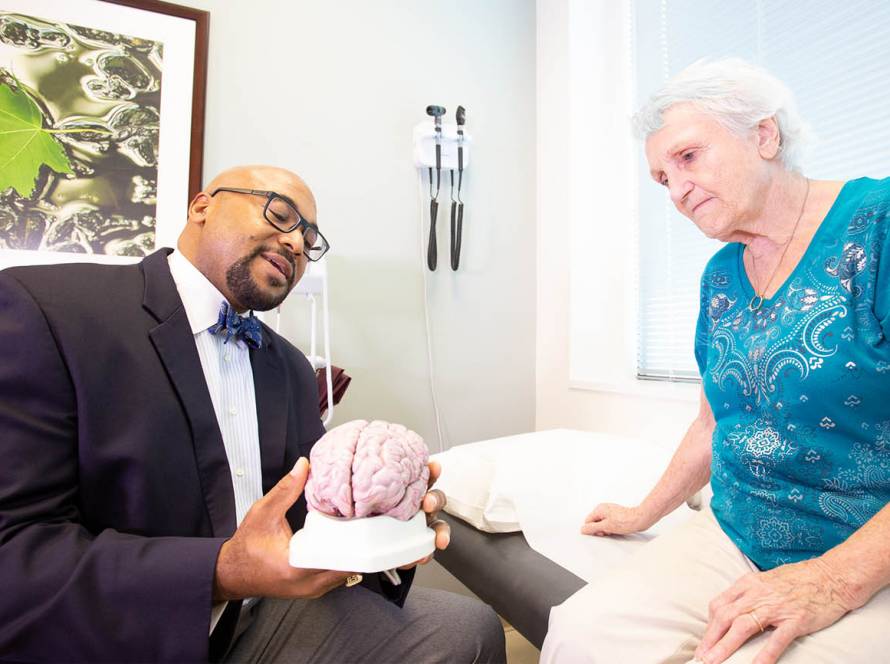
Who Are The People I See?

Phone: 850-785-0029 | 2011 Harrison Avenue Panama City, Florida 32405 | 2441 Hwy 98 Santa Rosa Beach, FL 32459
What Does a Neurologist Do on Your First Visit? Preparing for Your Appointment
January 24, 2024 | Brain and Spine Specialists
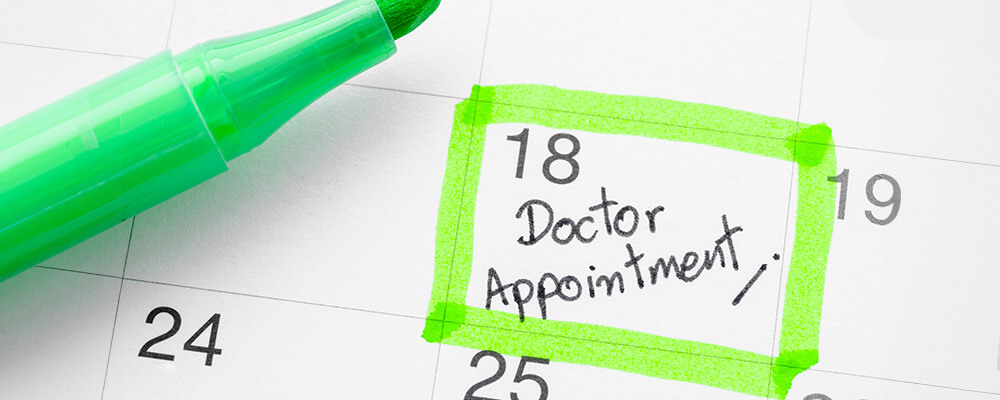
As we step into a new year, prioritizing health becomes a key resolution for many. Visiting a neurologist for the first time can be a part of this journey. This blog aims to demystify the process and help you prepare effectively for your appointment.
Understanding the Role of a Neurologist
A neurologist is a medical specialist focusing on diagnosing and managing disorders of the brain, spinal cord, and nerves. These experts handle a variety of conditions, including epilepsy , multiple sclerosis , Parkinson’s disease , stroke , and more . Neurological health is a crucial aspect of overall well-being, as it affects numerous facets of life. Early and accurate diagnosis, followed by effective management of neurological conditions, is vital. It not only addresses immediate health concerns but also plays a significant role in maintaining long-term quality of life. Visiting a neurologist, therefore, is an important step towards ensuring comprehensive health care.
Preparing for Your Neurology Appointment
Preparation is key to a successful neurology appointment. Being well-prepared can ensure that your neurologist has all the necessary information to make an accurate diagnosis and develop an effective treatment plan.
Gathering Your Medical Records
Before your appointment, gather all relevant medical records, test results, and a list of current medications. This includes any previous neurological evaluations, MRI or CT scan results, and blood work. Having these documents at hand allows the neurologist to gain a comprehensive understanding of your medical history. It’s also important to include records of treatments or medications you’ve tried in the past, as this information can be crucial in determining the best course of action for your condition.
Making a Symptom Diary
Maintaining a symptom diary is an invaluable tool for both you and your neurologist. In this diary, record the nature of your symptoms, their frequency, intensity, and any potential triggers or alleviating factors. Also, note any patterns or changes in your symptoms over time. This detailed account can provide critical insights into the nature of your neurological issues, helping your neurologist to make a more precise diagnosis and tailor your treatment accordingly.
What to Expect During Your First Neurologist Appointment
A first-time visit to a neurologist, especially at a referral-based practice like Brain & Spine, can be an important step in addressing your neurological health. Understanding what to expect, starting from obtaining a referral to the appointment itself, can make the process smoother.
Starting with a Referral at Brain & Spine
Before scheduling your first appointment at Brain & Spine, which operates primarily on a referral-only basis, you’ll need to obtain a referral from your primary care physician. This is a standard procedure at Brain & Spine to ensure that patients receive specialized care in a coordinated manner. Your primary care physician will evaluate your symptoms and, if they deem it necessary, will refer you to a neurologist at Brain & Spine. This referral not only helps in streamlining your care but also ensures that the neurologist has a comprehensive understanding of your medical background right from the first visit.
The Initial Consultation
The initial consultation is a critical component of your visit. Here, the neurologist will engage in a detailed discussion about your medical history. This includes understanding any symptoms you’ve been experiencing, reviewing past medical records, and discussing any previous treatments or diagnostic tests you’ve undergone. This conversation is pivotal for the neurologist to form an initial understanding of your neurological health and to identify potential areas that require further examination or testing.
Comprehensive Neurological Examination
Following your initial consultation, you will undergo a comprehensive neurological examination. This examination includes various assessments such as tests for muscle strength, reflexes, coordination, sensation, balance, and mental function. These tests are essential for detecting any neurological abnormalities and guiding further diagnostic procedures.

Embracing Your Neurological Health
Embarking on your neurological health journey with Brain & Spine is a proactive step towards better health. Their team of specialists is dedicated to providing comprehensive care, from initial consultations to detailed follow-up appointments. By being well-prepared and engaging actively with your neurologist, you’re setting a strong foundation for effective management of your neurological condition. Remember, at Brain & Spine, your neurological health is a priority, and their tailored approach to treatment and care is designed to support you every step of the way on this important journey.
Categories:
- Brain Specialist
- Spine Specialist
- Patient Portal

Preparing for Your Neurologist Appointment
Take control of your condition by being an active participant in your healthcare, by karen hales, neurology solutions contributing writer.
Receiving or awaiting a diagnosis of a potentially debilitating movement disorder can bring about a sense of unease and uncertainty. Many patients may become overwhelmed and feel they have lost control over their life. Some may want to ignore their diagnosis and put off seeking care.
Neurological disorders such as ataxia, dystonia, Parkinson’s disease and Multiple Sclerosis bring with them a host of potential symptoms affecting movement, daily activities and mental status, and no two cases are the same. One way to feel more in control is to become informed about your disease and to take an active role in your healthcare, which includes preparing for your neurologist visit.
Choosing a specialist to supervise your overall healthcare is essential. An open relationship with your physician can be a powerful factor in maintaining your physical and emotional well-being for the long term. This article is to assist you in having productive appointments with your neurologist to make sure your questions are answered and you can feel and function better despite your condition.
New patients of Neurology Solutions Movement Disorders Center will be asked to complete a medical intake questionnaire , which is available to download in advance. The questionnaire will ask for details on your health history, the condition you are being referred for, and any other conditions for which you are being treated. New patient consults are approximately 45-60 minutes and will include a thorough neurological exam. Follow up exams will take approximately 30-45 minutes. Parkinson patients are seen again in three to six months. Call Neurology Solutions at 512-865-6310 to make an appointment.
Only you know what is going on in your body on a day-to-day basis. Some things may be minor and some may progress over time. Your role is to provide your doctor information about your health, health history, medications and symptoms, and to report any specific changes in your condition since your last medical appointment.
Before Your Appointment
- Prepare to arrive a little early for your scheduled appointment to provide time to fill out any necessary paperwork and so you can gather your thoughts before you meet with the doctor.
- Bring the name and address of your primary care physician so he can receive a copy of the medical report following your visit. Have your insurance card and doctor’s referral form with you. Bring a record of medical test results and reports related to the condition.
- Have a list of all medications and dosages, including supplements, you are taking, as some medications can interact poorly with others.
- Since some conditions may have a genetic component, find out your family medical history specifically related to walking or coordination problems of family members, including grandparents, parents, aunts and uncles, siblings and cousins.
- Keeping a log or journal of your symptoms to refer to is a helpful tool in tracking your condition’s progression and to better determine what treatments or medications are working.
- Be specific in describing your symptoms and how they affect your daily living activities, including estimated periods of time when the symptoms became apparent or worsening. Select the top three symptoms or problems that are most severe to discuss during your appointment.
- Be prepared to answer: What other medical conditions do you have? Have you had an adverse reaction to any medications? How and when did symptoms of your condition come on? How have your symptoms changed since that time? What activities does your condition make difficult to do? What makes your symptoms worse? What makes your symptoms better?
- If you have recently started a new medication or therapy regimen, be prepared to discuss any side effects or results of the treatment. Have a list of three or four key questions you would like to discuss with your neurologist so you don’t leave the appointment with additional worries.
- If you think you will have difficulty remembering or understanding your doctor’s instructions, bring along a loved one or friend to your appointment to take notes and help ask questions.
Many neurological conditions require lifestyle changes. Many neurological medications are started or changed gradually according to instructions provided during your appointment. Let your neurologist know if you are unclear on the instructions and the information you are given. Often, a nurse or other staff member can spend more time with you if needed.
After Your Appointment
Make appointments for any follow-up tests, therapies or other medical orders immediately. Make sure your primary care physician receives a copy of your neurologist’s report. There may be a list of recommendations to discuss with your doctor.
Begin taking any medication prescriptions immediately, and report any troubling side effects to your neurologist as soon as they appear.
You should be reassessed every six months or with any sudden decline in mobility or change in behavior to best manage your condition. A variety of resources and healthcare organizations are available to help expand your understanding of your condition and provide support and programs to help you stay active and maintain a high quality of life.
To learn more about maximizing your visit with your neurologist, see the Parkinson’s Disease Foundation’s Checkup Checklist .
Stay informed by frequenting Neurology Solutions’ blog , or join Neurology Solutions Movement Disorders Center’s e-mail list to stay up to date on the latest in treatments, how to manage stress and maintain quality of life while battling illness, and tips for staying healthy.
Become a New Patient at Neurology Solutions
If you'd like to establish care at Neurology Solutions as a new patient, click the button. Here you'll find everything you need to know.
© 2024 Neurology Solutions. All Rights Reserved.
Subscribe for Free!
We'll send you our print magazine 6x per year!
Subscribe Now
Prefer email? Sign-up for our email newsletter
Five Questions to Ask Your Neurologist

You've waited weeks to see your neurologist. When you arrive, she conducts a physical examination and asks about your symptoms since the last visit, all of which is vital. But when you or a family member has a chronic or life-threatening neurologic condition—such as Parkinson's disease (PD), Alzheimer's disease (AD), multiple sclerosis (MS), or a brain tumor—the concerns that keep you up at night might not make it into those discussions. Maybe you're concerned about your job, but you can't seem to find the right opportunity to bring it up.
In the last issue of Neurology Now , we discussed five tests or treatments that you might not need . Here, neurologists choose five questions they think patients should ask to get the best possible care.
Should I Get a Second Opinion?
Bruce H. Cohen, M.D., Fellow of the American Academy of Neurology (AAN) and director of pediatric neurology Akron Children's Hospital, treats adults and children who have brain tumors. He recommends asking your neurologist if you should get a second opinion.
"Brain tumor treatment, especially if the tumor recurs, may differ depending on the medical center and the equipment available," Dr. Cohen says. "Ask your doctor if there are different ways to treat your tumor and whether technology better suited to treat it might be available elsewhere." Most medical centers can't afford all the different radiation therapy machines used to treat brain cancer, he says—nor provide all types of experimental chemotherapy, including gene therapy or vaccine therapy. "For example, a proton beam accelerator, which is used in patients who require very precise treatment of their brain cancer, is found at only a few centers across the United States," Dr. Cohen notes.
When Dr. Cohen recommends a specific treatment, he informs his patients which therapy is available at his hospital and whether treatment differs elsewhere. He often offers his first and second choice of treatment options and provides patients the opportunity to get a second opinion if additional options are offered at other facilities.
That's exactly what he did in 1994 after diagnosing a young child who had what appeared to be a slow-growing malignant brain tumor . Although he had recommended chemotherapy to the mother, he also referred her to another expert whom he respected but thought might disagree with him. Indeed, that second neurologist recommended radiation therapy; later, a third neurologist recommended a watch-and-wait approach. The family returned to Dr. Cohen after opting for the third option of cautious observation. And the child, now an adult, has been returning to Dr. Cohen once a year...for the past 19 years.
Most of the time, doctors welcome questions such as this. If for some reason your doctor is offended, you can always seek out another opinion or contact a patient advocacy group.
Should I Start Making Plans to Change My Home or Job?
Make it a point to let your neurologist know where you live and what you do for a living, and ask whether you should anticipate changes over the course of your illness that would require adjustments. Caregivers should be involved in these discussions as well; in the case of many neurologic conditions, the patient may not have the insight to recognize when he or she is having cognitive difficulties. "Often, we get so caught up responding to what patients are dealing with in the present that we forget to help them anticipate and plan for the future," says Janis Miyasaki, M.D., associate professor and associate clinical director of the Movement Disorders Centre at the University of Toronto.
"Young doctors whom I train are often baffled when I ask them, 'Does this person live in a one- or two-story home, and does their main floor have a bathroom?'" Dr. Miyasaki says. She recommends that patients, caregivers, and family members bring up subjects such as living space or work conditions.
For example, for many people living with PD, climbing stairs may become difficult over time. These patients may benefit from advice about how to adapt their living space, such as by adding a chair lift for the stairs or a ramp. Moving to a single-level dwelling can often help them maintain independence for longer. In Dr. Miyasaki's experience, it may take a year or two for someone to accept the necessity of moving to a single-level dwelling. But after the first six months, she has found, most people say it was their wisest decision.
It's also important for family members to discuss any of their own health problems that might interfere with the caregiving role. The wife of a man with PD revealed to Dr. Miyasaki that she was about to undergo a total hysterectomy. She hadn't considered how this would affect her husband, whom she regularly assisted up the stairs. Dr. Miyasaki was able to help arrange for temporary home care so that they could both remain safe.
Dr. Miyasaki also advises people with chronic neurologic conditions to discuss their job responsibilities with their neurologist, who may be able to help if or when modifications become necessary.
"Physically, it might be easy to anticipate when you need modifications to your job—for example, changing a variable shift to a set schedule or switching to a more flexible role with built-in rest periods in case sleeping patterns are disrupted," Dr. Miyasaki says. One of her patients, a research technician, noted that he had difficulty measuring liquids when his PD medications began to wear off. She was able to support him by writing a letter requesting modification to alter his schedule accordingly. She assisted another patient, the CEO of a large investment firm, in getting long-term disability benefits. He'd developed cognitive problems as the result of his PD and couldn't properly fulfill his duties any longer.
How Will This Test Impact My Care?
Ronald C. Petersen, M.D., Ph.D. AAN member and director of the Mayo Clinic Alzheimer's Disease Research Center in Rochester, MN, recognizes that more testing isn't always better—especially for dementia , in which biomarkers are becoming increasingly available to help identify causes. (A biomarker is a laboratory measurement that reflects the activity of a disease.) "Nevertheless, a condition such as AD is diagnosed on the basis of a thorough history and neurologic examination, not a test," he says.
"When a doctor recommends a PET scan (an imaging test that uses a radioactive substance to look for disease), an amyloid imaging scan (a type of PET scan that detects beta-amyloid deposits characteristic of AD), or a spinal tap for tau and beta-amyloid, patients should ask what each test would add to the certainty of the diagnosis. Patients should also ask if a test will lead to any different recommendations or help with the prognosis, and if any risks are associated with it," Dr. Petersen says. Keep in mind that testing often is not covered by insurance.
Clinical symptoms and history are often enough to diagnose AD with a reasonable degree of certainty, according to Dr. Petersen. "If an 85-year-old man with a gradual history of forgetfulness becomes unable to use his checkbook but is able to live alone, the probability of AD is high, and you don't need to do an exotic test," he says. Additional testing is typically warranted when the person has unusual symptoms—such as problems with language instead of memory—or is unusually young with no family history of AD, he says.
What Side Effects Can Occur With This New Medication?
You may be reluctant to start taking a drug because you've heard about someone doing poorly on it. Maybe you've been warned about its side effects. Sometimes, the side effects do outweigh the benefits of treatment. Asking your neurologist about possible side effects allows her to address your concerns and set the record straight about potential harms.
Jay E. Selman, M.D., AAN member, and chief of neurology at Blythedale Children's Hospital in Valhalla, NY—whose areas of expertise include epilepsy , autism, Tourette's syndrome, and traumatic brain injury-believes it's essential to have an open and thorough discussion about all the possible side effects of any medication you're about to start.
The parents of an 8-year-old boy evaluated by Dr. Selman declined a trial of methylphenidate (Ritalin) for severe attention deficit-hyperactivity disorder (ADHD). The reason was that the father—who'd heard methylphenidate was "just like what the street gangs were selling"—was dead set against all medications. But after Dr. Selman informed him about potential side effects and explained that the medication was not addictive when used appropriately and supervised by a physician, the father agreed to a trial. "At the next visit, the reports from teachers and family noted a significant improvement in his attention, and we were able to make further adjustments to the dose," Dr. Selman recalls.
When children are patients, the subject may require discussion with the patient as well as with parents. "All communication requires a framework based upon the child's chronological and developmental age, the seriousness of the underlying condition, and the family dynamics," Dr. Selman explains. He typically asks children and teens to notify their parents if they don't feel well, or if something is different, so that the family may contact him. He asks older adolescents to call him directly, as well. He advises all patients to call him immediately if they observe something of concern.
Your neurologist typically discusses those side effects that he or she believes are most likely to occur or have the most serious consequences. Dr. Selman first addresses those that are potentially dangerous, such as a rash that may develop with the anticonvulsant lamotrigine (Lamictal). He then mentions those that may occur frequently, such as gastrointestinal upset with a nonsteroidal anti-inflammatory drug or appetite suppression and sleep problems with an ADHD drug. He likens the discussion to the other day-to-day decisions we all make about relative risks and benefits. "I might say to someone, 'To get to my office today, you had to decide whether to take the parkway or local streets by weighing travel time, the risk of weather and road conditions, and so forth. We do the same thing when we weight the benefits of the treatment versus the potential adverse effects.'"
Giving the patient and the family as active a role as possible in decision-making is important to Dr. Selman, who lets patients know he will continue to work with them, even if they decide not to follow his recommendations.
How Will This Treatment Improve My Quality of Life?
Lily Jung Henson, M.D., has been taking care of patients with MS for 23 years, currently as chief of staff at Swedish Issaquah Hospital and medical director of Swedish Issaquah Neurology, both in Issaquah, WA. "Neurologists tend to think about treatment success as it pertains to disease activity—in the case of MS, relapses or progression. But patients may care more about how they feel between the disease episodes or as a result of the side effects of the medicine," she notes.
"For example, we may be very happy because the patient is having fewer exacerbations of the disease and showing no progression. But, the patient might be miserable because she is unable to participate in activities she used to love, like going to her child's soccer game," Dr. Jung Henson says.
"In a situation like that, no matter how well the drug is doing in terms of reducing flare-ups, the side effects demand switching to a more tolerable drug," she says. In addition, Dr. Jung Henson says, she would discuss adjusting the woman's schedule to leave more energy for soccer games, consider prescribing anti-fatigue medications to give her more energy while there, and recommend that she wear a cooling vest and drink cool liquids in very warm weather.
The goal of a given treatment may not directly address quality of life, such as physical activity, social activity, personal fulfillment, mobility, and independence. Don't forget to remind your doctor that these things matter.

Keyword Search
Services & treatments, provider search, location search, first neuropathy appointment here’s what you need to know.

You hurt. You hurt a lot, and the pain is frequent. As a result, you’ve conducted research and discovered your pain symptoms matched common signs of nerve pain. Empowered with that information, you begin taking steps to ease your neuropathy by making healthier lifestyle choices and working with a physician to identify the cause of your pain.
Upon completing several examinations, you receive an official diagnosis of neuropathy from your primary care physician. Your questions have been answered, you’ve discussed different treatment options and have decided that Intraneural Facilitation or INF™ is a fit for you. You’ve made your appointment and now you want to know: what comes next?
In that spirit, here are three things to expect out of your first office visit to Loma Linda University Health’s Neuropathic Therapy Center.
1. A thorough discussion of your pain history
For your first appointment, I recommend you bring your medical files, notes and be prepared to talk about your pain history. Topics you will discuss with your therapist will include your symptoms, timeline for your pain and severity. Additionally, the therapist may ask questions about physical, nutritional and lifestyle factors that can be contributing to your pain symptoms. The more information you can provide in this session, the better the therapist will be able to understand your pain needs.
2. Partake in a sensory exam
A sensory exam tests neurological performance. Typically, this detailed examination includes a balance test, a pain and light touch test, strength assessment, temperature, and vibration testing. This will help the therapist customize a treatment plan for your specific pain-needs. In addition to INF™, patients will receive a comprehensive plan that includes exercises, a nutrition guide, and other pain management recommendations.
3. First tailored therapy session
Upon finishing the sensory exam, you will have your first INF™ session . While the treatment plan varies patient to patient, INF™ is a noninvasive therapy that stimulates healing the nerves by improving blood flow to them. Utilizing three unique holds, tiny openings occur in the arteries surrounding the nerves allowing blood to flow to the nerves. We have found that more than 75% of patients begin to feel relief and experience improved flexibility after their first treatment.
In following the traditions of Loma Linda University Health, we are committed to a whole-person approach to your pain. We want you to succeed in leading a healthy and pain-free life. Our goal for your first visit is to provide you quality treatment and empower you with the necessary tools to get you on that path.
Take the Next Step
If you’re suffering from nerve pain, our Neuropathic Therapy Center may be able to help using a breakthrough physical therapy treatment called Intraneural Facilitation or INF.™ For more information and to schedule an evaluation, call 909-558-6799 or request information online .
Neuropathic Therapy Center Treatment Options More Articles

We’re Stronger Together
With your help, we can make ambitious innovations in clinical care and education for our community.
- Get Published
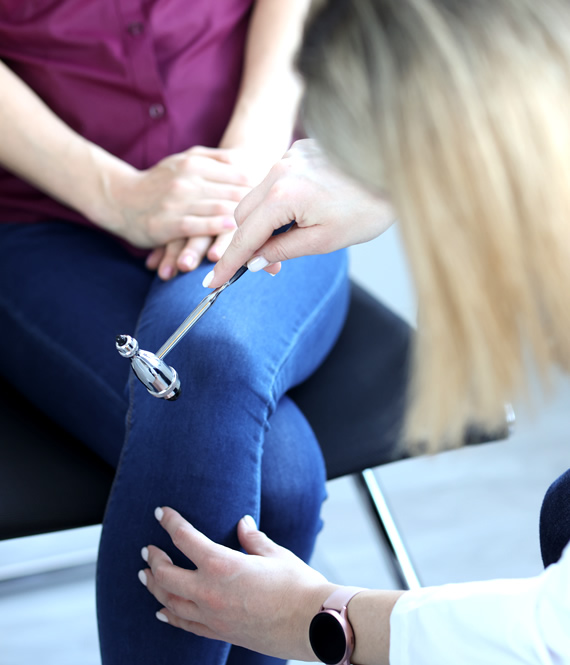
- Posted in in Body Health
What to Expect When You See a Neurologist For the First Time
- Posted by by Amber & The Team
- Updated on April 9, 2024
We recommend helpful products in our articles. Read our full disclosure here. The content on this website is not intended to be a substitute for professional advice, diagnosis, or treatment.
If you start experiencing symptoms that may signify a neurological disorder, like migraines, dizziness, or memory problems, you should see your doctor, who will probably refer you to a neurologist.
You should also see a neurologist to examine the health of your brain as a precautionary measure.
A neurologist is a doctor who specializes in diagnosing and treating disorders affecting the brain and nervous system.
Worrying about seeing a neurologist for the first time can be stressful, so you should prepare for the visit.
The following is what you can expect when you see a neurologist for the first time.
They Will Ask About Your Medical History
When visiting a neurologist for the first time, you should expect them to ask about your medical history.
Your doctor may send them your medical history, which would make it easier, but if you go directly to the neurologist, you should be prepared to present your medical history.
Therefore, you should prepare your medical records for presentation at the neurologist’s office.
Your medical gives the neurologist a lot of information they can use to diagnose and treat your condition, if any.
It could also help the neurologist develop ways for you to prevent any neurological disorders.
You May Have Access to Multiple Services in One Location
If you are seeing a neurologist for the first time, you should expect them to offer multiple services from the same location.
A neurologist may conduct various exams to diagnose a neurological disorder.
You may expect that you will have to visit different medical offices to get all the tests done, as is the case in many hospitals and clinics.
However, professional neurologists often have all the equipment they need under one roof.
It’s totally normal to expect multiple services in one location and it’s an important factor to consider when choosing your clinic.
For example, when seeking neurology care in Michigan , look for a place that offers it all in one place.
There may also be a research facility, pharmacies, and more.
Physical Exam
Most neurological disorders have physical manifestations such as loss of movement, poor balance, and seizures.
The neurologist will conduct physical tests to determine if you have a neurological disorder.
The physical tests may involve testing your hand-eye coordination, your reflexes, vision, and sensation.
The neurologist may also ask you to perform various exercises to test your strength.
Physical tests may also help to determine which type of neurological disorder you have or are prone to, such as Dementia .
Therefore, when you see a neurologist for the first time, you should expect a physical exam.
Medical Tests
When you go to a neurologist, you should expect them to perform various medical tests for diagnoses.
They will conduct the following tests:
- An MRI (magnetic resonance imaging) for images of your inner brain.
- Computerized Tomography (CT) or Computer-Assisted Tomography (CAT) scan to create multi-dimensional pictures of your body.
- An Electroencephalogram (EEG) where electrodes are attached to your scalp to record your brain’s electrical activity.
- An Electromyogram (EMG) is a test that tracks electrical activity in your muscles and nerves by injecting tiny needles into your muscles to determine the cause of pain, numbness, and weakness.
After conducting physical exams and medical tests, the neurologist will conclude the visit by giving you the results of your consultation.
Some tests will provide results immediately, and the neurologist will give you their conclusion.
The neurologist will provide the results for tests that take longer to produce results a few days after your consultation.
You should expect follow-up appointments, further tests, and maybe prescriptions after your first visit.
The neurologist may also recommend various therapies to do on your own after the consultation.
The first visit to a neurologist is nerve-racking, and you should do your best to prepare for the visit.
When you visit a neurologist for the first time, you should expect physical exams, medical tests, questions about your medical history, and multiple services in one location.
You will also receive the consultation results on the day or the following days.

Amber & The Team
"We love to research problems, examine studies, analyze solutions, and share with you ideas that make life healthier. You can learn about us and our editorial standards here . Have suggestions or feedback to share? Send us a message! ."
Leave a Comment
Leave a reply cancel reply.
Your email address will not be published. Required fields are marked *
Explore more
You might like these topics:

Girl Talk: How To Tighten Your Vagina Muscles

3 Most Common Reasons for Hormonal Imbalance

6 Healthy Weight GAIN Tips for Women

- Posted in in Clear-headed life
10 Strategies for Disrupting the Addiction Cycle

How To Determine If It’s Time To Get Orthopedic Services For You Or Your Loved One

- Posted in in Aging & elderly care
7 Best Supplements for Anti-Aging + The Importance Of Their Testing

7 Tips and Tricks to Have a More Relaxing Pregnancy

- Posted in in Weight Loss
The Best Time to Drink Protein Shakes to Promote Weight Loss

- Posted in in Self care
Why Is Self Care Important (For All Of Us)

- Posted in in Fitness & Exercise
5 Reasons to Include Variable Resistance Training in Your Workout

- Posted in in Healthy Eating
Benefits Of Edamame: 6 Ways These Tasty Beans Can Improve Our Health & Beauty

- Posted in in Family Wellness
7 Useful Ways to Improve Your Child’s Health
JavaScript is currently disabled. Please enable JavaScript for an optimal experience.
- ${result.term}
How to Prepare for a Movement Disorders Specialist Appointment
February 18, 2015.
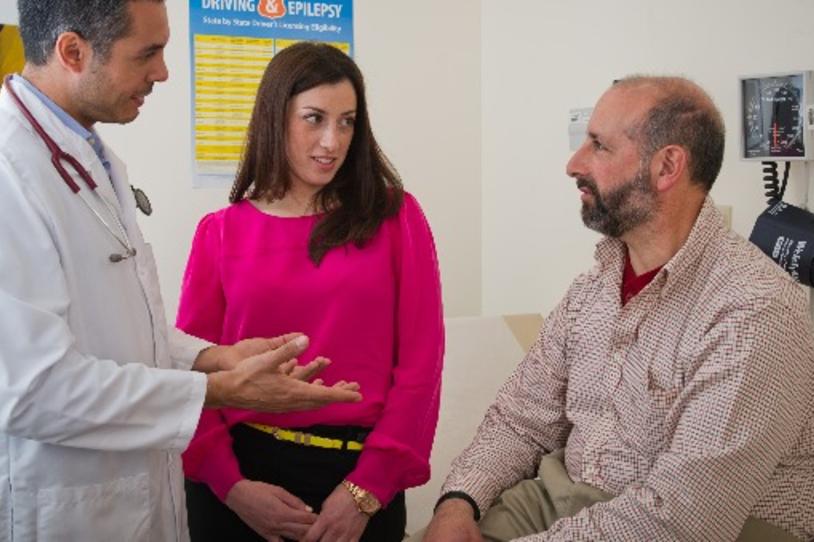
Movement disorders specialists are neurologists with additional training in Parkinson's disease, and are often the best kind of doctor to see for a definitive diagnosis or to work with to create an ideal effective treatment plan.
The first step is finding a doctor -- if you're based in the U.S., try our Movement Disorder Specialist Finder . If you don't see one in your area, try your closest large city. It's still helpful to see a specialist even if you can only make the trip a few times a year or less.
Once you've made your appointment, there are several steps you can take to make sure you get the most out of your visit. Our community shared advice on how to prepare for your appointment, and what to expect when you get there.
1. Take along an extra set of ears. Your caregiver, a family member or even a friend can help take notes, ask questions and share his or her perspective on your symptoms.

2. Make a list of questions you’d like to ask, and bring it with you. You can also take notes during the appointment.

3. A week or more before your appointment, chart your symptoms so you'll have you a useful record to share with your doctor. Be as descriptive as you can when sharing symptoms, and include any health complaints you have that you aren't sure are related to Parkinson's, including your moods. Bring all of your pills in the bottles with you as well. One commenter suggested making a short video on your phone to share during the appointment.

4. Be ready for a long day. The doctor will administer both motor and non-motor tests, and the whole process can take a few hours. One commenter said that he schedules appointments for the morning just before his regular medication time so his doctor will get the most accurate sense of his symptoms.

5. If you don't have a good experience, consider seeking out another movement disorder specialist in your area, if there is one. Many people, however, have very positive experiences seeing a specialist for the first time.

Nancy Ryerson
- Immediate family member has PD
- Immediate family member had PD
- Extended family member or friend has PD
- Extended family member or friend had PD
- I am a researcher, clinician or work with the PD community

What Does a Pediatric Neurologist Do On Your First Visit?
- December 21, 2022
Bringing your child to a doctor can be a worrying experience. It may even be more so to bring them to a new doctor. And it may even be intimidating when you bring them to a specialist like a pediatric neurologist . The best way to cool your nerves is to be armed with information about what will happen on your first pediatric neurologist visit.
Bring Prepared Information About Your Child’s Neurology
As with any new doctor, it is in your best interest to provide as much information as possible for a potential diagnosis. If your child has ever had any neurological, psychological, or medical evaluations you should bring documentation of the results. It will be beneficial to provide any supporting information from any other neurologically related testing, especially school testing or evaluations. Some examples of tests where results will be helpful include: Electrophalogram (EEG) , MRIs, and other lab work such as blood work and genetic testing. If you believe there is anything that would assist your pediatric neurologist in diagnosing concerning conditions like seizures or epilepsy , bring it with you.
You or your child may also have concerns or questions of your own. Preparing for your visit by creating a list of such concerns may help ease you through the process of your first visit. It will also assist in guiding your pediatric neurologist to a more firm diagnosis to provide unique information which may be missed by test results.
Your Child’s First Pediatric Neurologist Visit
Everything will be done to keep you and your child as comfortable as possible. Every child is different, and experiencing neurological issues can create a lot of friction. If you believe it to be helpful, reach out to the office before your first visit to make the process easy and smooth.
Your first pediatric neurologist visit may take around an hour depending on the amount and types of tests and diagnostic procedures used for the initial visit. Your specialist may use everything from asking questions about your child’s mental status to sensory exams to reflex tests, motor function capabilities, and more.
Upon examining your child with all of the provided information and tests, your specialist will provide a diagnosis for your child unless more information and testing will be helpful. Additionally, should a referral to a different type of specialist be necessary, like an occupational therapist or psychologist, you will be informed.
If you would like to learn more or you would like to schedule your first Pediatric Neurology appointment, please call 732-856-5999.
Related Posts

If you have seizures or are the parent of a child who has seizures, then…

While any person can have a seizure, people who have had two or more seizures…

Neurological conditions in children can change your life in an instant. You suddenly have a…
- previous post: Neurological Diseases and Disorders
- next post: The Role of the Pediatric Neurologist in Diagnosing and Managing Neurological Conditions in Children
The information on this website is for general information purposes only. Nothing on this site should be taken as medical advice for any individual case or situation. This information is not intended to create, and receipt or viewing does not constitute, a doctor-patient relationship.
© Copyright 2024 - All Rights Reserved. | Billing Info | Contact Us | Created by the minds at Shoreline Media Marketing
- Share full article
For more audio journalism and storytelling, download New York Times Audio , a new iOS app available for news subscribers.

- April 9, 2024 • 30:48 How Tesla Planted the Seeds for Its Own Potential Downfall
- April 8, 2024 • 30:28 The Eclipse Chaser
- April 7, 2024 The Sunday Read: ‘What Deathbed Visions Teach Us About Living’
- April 5, 2024 • 29:11 An Engineering Experiment to Cool the Earth
- April 4, 2024 • 32:37 Israel’s Deadly Airstrike on the World Central Kitchen
- April 3, 2024 • 27:42 The Accidental Tax Cutter in Chief
- April 2, 2024 • 29:32 Kids Are Missing School at an Alarming Rate
- April 1, 2024 • 36:14 Ronna McDaniel, TV News and the Trump Problem
- March 29, 2024 • 48:42 Hamas Took Her, and Still Has Her Husband
- March 28, 2024 • 33:40 The Newest Tech Start-Up Billionaire? Donald Trump.
- March 27, 2024 • 28:06 Democrats’ Plan to Save the Republican House Speaker
- March 26, 2024 • 29:13 The United States vs. the iPhone
How Tesla Planted the Seeds for Its Own Potential Downfall
Elon musk’s factory in china saved his company and made him ultrarich. now, it may backfire..
Hosted by Katrin Bennhold
Featuring Mara Hvistendahl
Produced by Rikki Novetsky and Mooj Zadie
With Rachelle Bonja
Edited by Lisa Chow and Alexandra Leigh Young
Original music by Marion Lozano , Diane Wong , Elisheba Ittoop and Sophia Lanman
Engineered by Chris Wood
Listen and follow The Daily Apple Podcasts | Spotify | Amazon Music
When Elon Musk set up Tesla’s factory in China, he made a bet that brought him cheap parts and capable workers — a bet that made him ultrarich and saved his company.
Mara Hvistendahl, an investigative reporter for The Times, explains why, now, that lifeline may have given China the tools to beat Tesla at its own game.
On today’s episode

Mara Hvistendahl , an investigative reporter for The New York Times.

Background reading
A pivot to China saved Elon Musk. It also bound him to Beijing .
Mr. Musk helped create the Chinese electric vehicle industry. But he is now facing challenges there as well as scrutiny in the West over his reliance on China.
There are a lot of ways to listen to The Daily. Here’s how.
We aim to make transcripts available the next workday after an episode’s publication. You can find them at the top of the page.
Fact-checking by Susan Lee .
The Daily is made by Rachel Quester, Lynsea Garrison, Clare Toeniskoetter, Paige Cowett, Michael Simon Johnson, Brad Fisher, Chris Wood, Jessica Cheung, Stella Tan, Alexandra Leigh Young, Lisa Chow, Eric Krupke, Marc Georges, Luke Vander Ploeg, M.J. Davis Lin, Dan Powell, Sydney Harper, Mike Benoist, Liz O. Baylen, Asthaa Chaturvedi, Rachelle Bonja, Diana Nguyen, Marion Lozano, Corey Schreppel, Rob Szypko, Elisheba Ittoop, Mooj Zadie, Patricia Willens, Rowan Niemisto, Jody Becker, Rikki Novetsky, John Ketchum, Nina Feldman, Will Reid, Carlos Prieto, Ben Calhoun, Susan Lee, Lexie Diao, Mary Wilson, Alex Stern, Dan Farrell, Sophia Lanman, Shannon Lin, Diane Wong, Devon Taylor, Alyssa Moxley, Summer Thomad, Olivia Natt, Daniel Ramirez and Brendan Klinkenberg.
Our theme music is by Jim Brunberg and Ben Landsverk of Wonderly. Special thanks to Sam Dolnick, Paula Szuchman, Lisa Tobin, Larissa Anderson, Julia Simon, Sofia Milan, Mahima Chablani, Elizabeth Davis-Moorer, Jeffrey Miranda, Renan Borelli, Maddy Masiello, Isabella Anderson and Nina Lassam.
Katrin Bennhold is the Berlin bureau chief. A former Nieman fellow at Harvard University, she previously reported from London and Paris, covering a range of topics from the rise of populism to gender. More about Katrin Bennhold
Mara Hvistendahl is an investigative reporter for The Times focused on Asia. More about Mara Hvistendahl
Advertisement
- International edition
- Australia edition
- Europe edition

‘Hardest Geezer’ Russ Cook enjoys a day off running after epic Africa journey
Endurance athlete from Worthing says he is ‘just trying to soak it all in’ after completing 352-day, 9,940-mile run
After sinking a strawberry daiquiri and a few beers and enjoying a reunion with his girlfriend after more than a year apart, Russ Cook, AKA the “Hardest Geezer”, who completed his 9,940-mile (16,000km) run along the entire length of Africa on Sunday, woke up feeling “a little bit frosty, a little bit tired”.
And for once, the 27-year-old endurance athlete from Worthing, West Sussex, who raised more than £700,000 for charity on his epic journey, was not pulling on his running shoes. It was all “quite, quite overwhelming”, he said.
“Just trying to soak it all in really, trying to enjoy it, and the thought of not running today is a bit of a mad one. It is very, very strange,” he told ITV’s Good Morning Britain (GMB) live from Tunisia, where he crossed the finish line on Sunday afternoon after running for 352 days through 16 countries.
“I think my body said ‘finally, nice one mate, chill out a minute’. Need to get some stretching done, maybe today, but yeah, no running. Unbelievable.”
Cook’s challenge, to become the first to run the entire length of Africa , began on 22 April 2023 at South Africa’s most southerly tip, Cape Agulhas, and ended at Tunisia’s most northerly point, Ras Angela. It captured the imagination of the public, with his social media posts amassing millions of views.
Some doubt has been cast on whether he is actually the first to run the length of continent, with the dispute appearing to centre on what technically constitutes the length of Africa.
The World Runners Association, a group of nine athletes who have successfully circumnavigated the globe on foot, claimed one of its members, Jesper Kenn Olsen from Denmark, was the first person to run the length of Africa, during his “world run” challenge in which he ran across several continents.
Olsen is said to have begun his challenge on 28 December 2008 in Taba, Egypt, and run 7,948 miles to the Cape of Good Hope in South Africa, completing his journey in 2010.
“Mr Olsen ran through Egypt, Sudan, Ethiopia, Kenya, Tanzania, Mozambique, Swaziland and South Africa. He hereby fulfilled the criteria for a full-length run across Africa,” said Phil Essam, the president of the WRA.
Cook’s significantly longer route was from south to north and along the west coast, and not as the crow flies.
He seemed unfazed, telling GMB: “I haven’t heard anything about it, to be fair. But there’s plenty of people before me that have done lots of big runs and kudos to all of them because they are big challenges. So nothing but respect, really.”
Cook faced several setbacks during his journey through rainforests, over mountain ranges and across the Sahara to raise money for the Running Charity , which provides running and mental health programmes for young people experiencing homelessness and complex needs, and Sandblast , which promotes awareness of the Saharawi people.
He was robbed at gunpoint in Angola, held by men with machetes in the Republic of the Congo, and had health scares and visa complications.
But there was never a moment he thought of giving up. “No, I always knew it was inevitable, just need to keep plugging away one step at a time and eventually it would get done,” he said.
He now plans a haircut and beard trim – “we’re looking a bit wild these days” – and will enjoy some time with his girlfriend, Emily Bell, who told GMB: “It’s been scary, terrifying at times.”
Cook said of seeing her: “It was crazy, the first time we have seen each other in 14 months. So I can’t really put into words how much that moment meant. But it’s beautiful to have a little bit of time with her.”
Speaking of the time he was most frightened, Cook said it had been when he went missing and was separated from his supporters for days in the jungle, but was eventually freed after villagers armed with machetes were paid off.
“The scariest moment was in the Congo, when I was on the back of a motorbike, thinking I was about to die, getting driven into the jungle. That was pretty nuts,” he told reporters in Tunisia. “Probably for about one minute I thought about quitting, and then I realised I couldn’t, so that was about as close as it got.”
Of his challenge overall he said: “I knew it was going to be hard but I knew I was also going into the unknown, so I had no idea really of how hard it was going to be.”
- Ultrarunning

‘I’m a little bit tired’: Briton becomes first person to run the length of Africa

Hallucinations and no sleep: Jasmin Paris on her historic ultramarathon

Ultrarunner Harvey Lewis reaches the end of Lazarus Lake’s endless backyard

British ultrarunner Jasmin Paris is first woman to finish Barkley Marathons

The Barkley Marathons: the hellish 100-mile race with 15 finishers in 36 years

John Kelly breaks record for scaling all 214 Wainwright fells in the Lake District

What happened when the Tarahumaras' love of ultrarunning went global?

Today in Focus Revisited: the danger – and beauty – of ultrarunning

‘An inordinate impact’: climate crisis leaves its footprint on trail running

‘These races are epic’: why ultrarunning is soaring in popularity
Most viewed.
Parents of Michigan school shooter Ethan Crumbley both sentenced to 10-15 years for involuntary manslaughter
PONTIAC, Mich. — The first parents to ever be charged , then convicted, in their child’s mass shooting at a U.S. school were both sentenced Tuesday to 10 to 15 years in prison after they faced the victims' families at a sentencing hearing in a Michigan courtroom.
James Crumbley, 47, and his wife, Jennifer, 46, were sentenced one after another by Circuit Court Judge Cheryl Matthews as they appeared together for the first time since they attended joint hearings before their landmark trials were separated last fall. Their son, Ethan, now 17, pleaded guilty as an adult to the 2021 shooting at Oxford High School in suburban Detroit and was sentenced to life in prison.
Matthews' sentencing decision was in line with what Oakland County prosecutors had asked for after both parents were found guilty on four counts of involuntary manslaughter, one for each of the students their son killed.
Matthews told the Crumbleys that the jury convictions were "not about poor parenting" but about how they repeatedly ignored warning signs that a "reasonable person" would have seen.
"These convictions confirm repeated acts that could have halted an oncoming runaway train," she said.
The couple will get credit for time served in an Oakland County jail since their arrests in the wake of the shooting on Nov. 30, 2021. The pair sat apart at the defense table with their lawyers beside them as the families of the four students who were killed asked before sentencing for the maximum terms to be imposed.
"When you texted, 'Ethan don't do it,' I was texting, 'Madisyn I love you, please call mom,'" Nicole Beausoleil, the mother of shooting victim Madisyn Baldwin, 17, told the Crumbleys. "When you found out about the lives your son took that day, I was still waiting for my daughter in the parking lot.
"The lack of compassion you've shown is outright disgusting," she added through tears.
Jill Soave, the mother of another slain student, Justin Shilling, 17, said the parents' inaction on the day of the shooting "failed their son and failed us all."
Justin's father, Craig Shilling, said he was troubled by Jennifer Crumbley's testimony during her trial in which she said she would not have done anything differently, even today.
"The blood of our children is on your hands, too," Craig Shilling said.
James Crumbley wore an orange jumpsuit and headphones to help with his hearing, and Jennifer Crumbley wore a gray-and-white jumpsuit. He did not look at his wife, while she glanced in his direction.
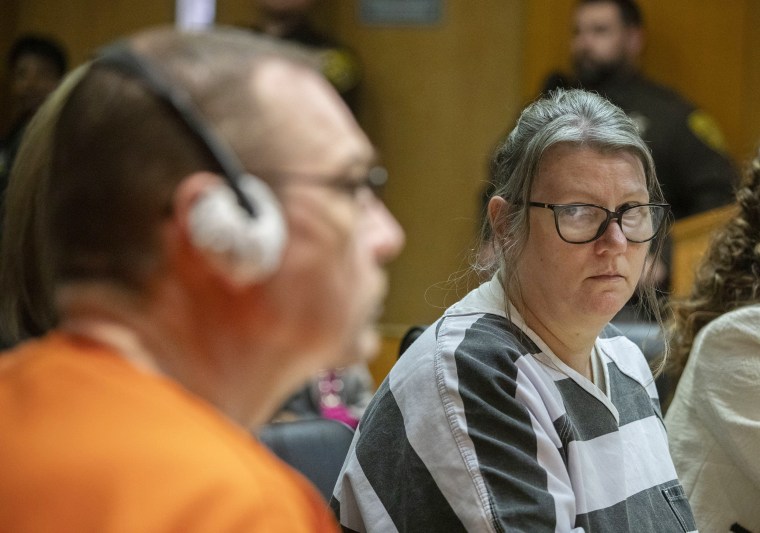
In Michigan, prosecutors said, felonies that rise out of the same event must run concurrently, so the most Matthews could have imposed is 15 years in total. And while prosecutors wanted the parents to receive sentences that exceeded the advisory guideline range, Matthews had the ultimate discretion, weighing factors such as past criminal behavior and the circumstances of their crimes.
Before she was sentenced, Jennifer Crumbley told the court that she felt "deep remorse, regret and grief" about the shooting, but she also deflected some of the blame onto school officials and took offense to the prosecution's strategy portraying her as a neglectful mother .
"We were good parents," Crumbley said. "We were the average family. We weren't perfect, but we loved our son and each other tremendously."
James Crumbley also addressed the court, explaining to the judge that he did not know beforehand about his son's planned attack on his school and telling the victims' families directly that he would have acted differently on the day of the shooting.
"Please note that I am truly sorry for your loss as a result of what my son did," he said. "I cannot express how much I wish I had known what was going on with him or what was going to happen."
Matthews said during Tuesday's sentencing that the family would not be housed together and that the state Corrections Department has indicated James and Ethan Crumbley specifically will not be in the same facility given their relationship. Ethan is being held in a state prison 17 miles from Oxford High School. Jennifer Crumbley would be sent to the state's only women's prison.
James and Jennifer Crumbley have not been able to communicate as part of a no contact order since their arrests.
In both parents' cases, prosecutors wrote that their "gross negligence changed an entire community forever."
They both could have prevented the shooting with "tragically simple actions," prosecutors wrote, adding that they "failed to take any action when presented with the gravest of dangers."
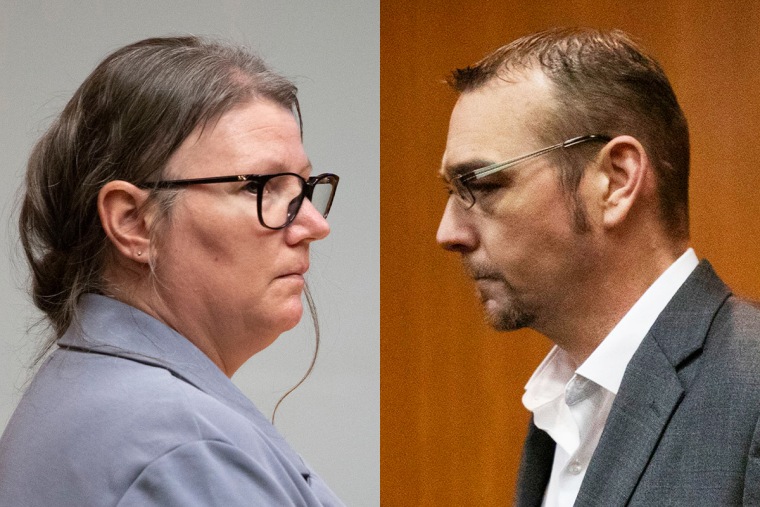
Legal experts had suggested James Crumbley could have faced a harsher sentence than his wife after prosecutors said he made threats in jail.
During his trial, Matthews restricted his communication to only his lawyer and clergy.
The sentencing memo for James Crumbley referred to allegations that he made threats against the prosecutor and said that "his jail calls show a total lack of remorse" and that "he blames everyone but himself."
The memo details the expletive-ridden threats he is alleged to have directly addressed to the prosecutor on multiple recorded jail calls. In one call before the trial, he said, "Karen McDonald, you're going down," according to prosecutors. In other calls, he threatened retribution, they said.
James Crumbley’s lawyer, Mariell Lehman, wrote in court documents that the calls did not include threats to physically harm the prosecutor but that he expressed his desire to ensure that McDonald is not able to continue practicing law as a result of her actions in the case.
"It is clear Mr. Crumbley is venting to loved ones about his frustrations related to the lack of investigation done by the prosecution prior to authorizing charges," Lehman wrote, saying her client is understandably angry at his situation.
The prosecution's memo also says James Crumbley asserted his innocence in a pre-sentence report, indicating a lack of remorse.
"I feel horrible for what happened and would do anything to be able to go back in time and change it! But I can't. And I had nothing to do with what happened," he wrote, according to the prosecution memo. "I don't know why my son did what he did. HE is the only one who knows."
Lehman has not said whether she plans to appeal James Crumbley's verdict, while a lawyer for Jennifer Crumbley, Shannon Smith, has written that she will.
Two separate trials
James Crumbley did not take the stand during his trial. His wife testified that she placed the responsibility of securing the 9 mm semiautomatic handgun used in the shooting on her husband.
Asked whether she would have done anything differently, Jennifer Crumbley told jurors, "I don't think I'm a failure as a parent."
Prosecutors argued that she knew of her son's deteriorating mental health and social isolation and that he had access to a gun but that she cared more about her hobbies and carrying on an extramarital affair than about being present at home.
Her defense lawyer attempted to portray her as a caring mother, albeit one who did not know her son was capable of such violence — suggesting instead that his school failed to fully inform her of his troubles and that her husband was responsible for the weapon.
Smith continued to defend her client in her sentencing memo.
"Criticizing Mrs. Crumbley for being 'rarely home' is a sexist and misogynistic attack on a mother," Smith wrote.
In a pre-sentence report, Jennifer Crumbley said she has the hindsight now to know she would have handled things differently.
"With the information I have now, of course my answer would be hugely different," she said. "There are so many things that I would change if I could go back in time."
Both her and her husband's trials centered on the day of the shooting.
A day after Thanksgiving, prosecutors said, James Crumbley bought their son the handgun, while Jennifer Crumbley took him to a gun range that weekend.
On Tuesday, a teacher said she had found a note on Ethan's desk with a drawing of a gun and a person who had been shot, along with messages including: "The thoughts won't stop. Help me."
That discovery prompted the school to summon the parents for a meeting, but school officials testified that they declined to bring him home because they had to go back to work.
The officials also said that if the parents had informed them that their son had access to a gun, they would have been more authoritative to ensure immediate safety.
Ethan would go on to commit the school shooting later that afternoon, killing Baldwin; Shilling; Tate Myre, 16; and Hana St. Juliana, 14.
Victims' families want accountability
In the aftermath of the trials, the victims' families have demanded further accountability. They are seeking changes to governmental immunity laws that protect schools from being sued and want to see a requirement for independent reviews after any mass shooting.
Oakland County prosecutors have said they do not plan to charge anyone else in connection with the massacre.
Buck Myre, the father of Tate Myre, said during Tuesday's sentencing that families still want a government-led investigation.
"It's time to drive real change from this tragedy," he told the judge.
Later, James Crumbley stood and addressed Buck Myre directly when he was given the chance to speak.
"It is time that we all know the truth," he said. "I, too, want the truth, because you have not had it."
Selina Guevara and Maggie Vespa reported from Pontiac and Erik Ortiz from New York.
Selina Guevara is an NBC News associate producer, based in Chicago.
NBC News Correspondent
Erik Ortiz is a senior reporter for NBC News Digital focusing on racial injustice and social inequality.

IMAGES
VIDEO
COMMENTS
What to Expect at Your First Appointment at the Renown Institute for Neurosciences. Duration and Purpose: Your first appointment will last approximately one hour. This time allows the doctor to ask specific questions, do a thorough neurological exam and discuss your concerns. Specialized Care: You will be matched with a provider who specializes ...
Neurologists are doctors who specialize in the diagnosis and treatment of various disorders of the brain, spinal cord, and nervous system as a whole. The human nervous system consists of the ...
The primary focus is usually on body reflexes, muscle strength, and sensory nerves coordination. The initial encounter in the first visit to neurologist is usually an interaction session. It starts with introductions and brief interrogation of your medical history. After that, the neurologist will decide what route to take in your diagnosis.
What to expect during your first appointment. During this visit, your doctor will discuss your medical history with you in detail, perform a physical examination, and discuss possible treatment options. Your doctor may send you for laboratory tests during your first appointment.
Prepare to arrive a little early for your scheduled appointment to provide time to complete any necessary paperwork and gather your thoughts before you meet with the doctor. Bring the name and address of your primary care physician so he can receive a copy of the medical report following your visit. Have your insurance card and doctor's ...
A neurologist is a doctor who treats and diagnoses conditions in the brain and nervous system. Your regular doctor may recommend that you see a neurologist if you have migraines or headaches ...
If you are experiencing any of the following problems, it is always best to see a neurologist for an accurate diagnosis and treatment plan: Headaches. Dizziness. Numbness or tingling in the arms or legs. Weakness in the arms or legs. Problems with balance or walking. Difficulty speaking or swallowing. Memory problems.
It's important to plan what you want to tell your doctor. If possible, let your physician know at the start of the office visit (or even before the visit, such as by phone) about changes in your health. Make a list of the top three things you want your neurologist to know and bring it with you to your visit. Order it in terms of priority with ...
Upon your first visit to the neurologist, the first thing that will happen is of course a brief introduction of both of you. Then the doctor will likely review your medical history and ask you some questions. Then they will most likely have you go through a physical exam and neurological exam as well. This exam will typically be a way for the ...
Neurologists are medical doctors with specialized training in evaluating, treating and managing signs and symptoms related to the nervous system. You could be referred to a neurologist for a ...
If your primary care physician refers you to a Neurologist, here's what you can expect. During your first appointment, a Neurologist will likely ask you to participate in a physical exam and neurological exam. Neurological exams are tests that measure muscle strength, sensation, reflexes, and coordination.
A neurologist is a medical specialist focusing on diagnosing and managing disorders of the brain, spinal cord, and nerves. These experts handle a variety of conditions, including epilepsy, multiple sclerosis, Parkinson's disease, stroke, and more. Neurological health is a crucial aspect of overall well-being, as it affects numerous facets of ...
Before Your Appointment. Prepare to arrive a little early for your scheduled appointment to provide time to fill out any necessary paperwork and so you can gather your thoughts before you meet with the doctor. Bring the name and address of your primary care physician so he can receive a copy of the medical report following your visit.
He recommends asking your neurologist if you should get a second opinion. "Brain tumor treatment, especially if the tumor recurs, may differ depending on the medical center and the equipment available," Dr. Cohen says. "Ask your doctor if there are different ways to treat your tumor and whether technology better suited to treat it might be ...
A neurologist is a medical doctor who diagnoses, treats and manages disorders of the brain and nervous system (brain, spinal cord and nerves). A neurologist knows the anatomy, function and conditions that affect your nerves and nervous system. Your nervous system is your body's command center. It controls everything you think, feel and do ...
A neurologist treats disorders that impact the brain, spinal cord, and nerves. Neurologists specialize in studying and treating the brain and nervous system. They diagnose and treat problems that include Alzheimer's disease, Parkinson's disease, multiple sclerosis, stroke, amyotrophic lateral sclerosis (ALS), epilepsy, migraine, and ...
Your headaches start suddenly. Your pain lasts for more than a day. Your headaches start early in the day. Nausea. Light sensitivity. Lightheadedness. If any of these symptoms disturb your daily ...
In that spirit, here are three things to expect out of your first office visit to Loma Linda University Health's Neuropathic Therapy Center. 1. A thorough discussion of your pain history. For your first appointment, I recommend you bring your medical files, notes and be prepared to talk about your pain history.
The first visit to a neurologist is nerve-racking, and you should do your best to prepare for the visit. When you visit a neurologist for the first time, you should expect physical exams, medical tests, questions about your medical history, and multiple services in one location. You will also receive the consultation results on the day or the ...
1. Take along an extra set of ears. Your caregiver, a family member or even a friend can help take notes, ask questions and share his or her perspective on your symptoms. 2. Make a list of questions you'd like to ask, and bring it with you. You can also take notes during the appointment. 3.
Bring another adult. If you plan to be the key speaker at the appointment, bring another adult who can help take notes. This will allow you to be fully engaged in the conversation with the doctor, but also leave with a written record of anything you might forget. If possible, let your child be involved. If they're able to verbally communicate ...
Bringing your child to a doctor can be a worrying experience. It may even be more so to bring them to a new doctor. And it may even be intimidating when you bring them to a specialist like a pediatric neurologist.The best way to cool your nerves is to be armed with information about what will happen on your first pediatric neurologist visit.
neurologist. We recommend you print this form out and bring it to the visit with you as well as keep an electronic or paper copy for yourself. It will be a valuable resource to track your child's journey and ensure the best quality of care. 1. A copy of visit notes from your last medical visit related to this condition. 2.
Lancaster, New Hampshire: Partial eclipse begins at 2:16 p.m. ET and totality at 3:27 p.m. Caribou, Maine: Partial eclipse begins at 2:22 p.m. ET and totality at 3:32 p.m. ET. Other resources can ...
Shares of Trump Media have erased all their gains since they began trading under the ticker DJT last month. The stock closed down more than 8% Monday at $37.17 after falling about 11% earlier in ...
Seven others were injured. Ethan Crumbley pleaded guilty to 24 charges, including first-degree murder, and was sentenced last year to life in prison without parole. He is still eligible to appeal ...
NBC News climate reporter Chase Cain is at an Arkansas nature preserve for a first hand look at how animals in the wild respond to the total solar eclipse. April 8, 2024. Get more news on.
Featuring Mara Hvistendahl. Produced by Rikki Novetsky and Mooj Zadie. With Rachelle Bonja. Edited by Lisa Chow and Alexandra Leigh Young. Original music by Marion Lozano , Diane Wong , Elisheba ...
Cook said of seeing her: "It was crazy, the first time we have seen each other in 14 months. So I can't really put into words how much that moment meant. But it's beautiful to have a little ...
The first parents to ever be charged, then convicted, in their child's mass shooting at a U.S. school faced the victims during a sentencing hearing in a Michigan courtroom.